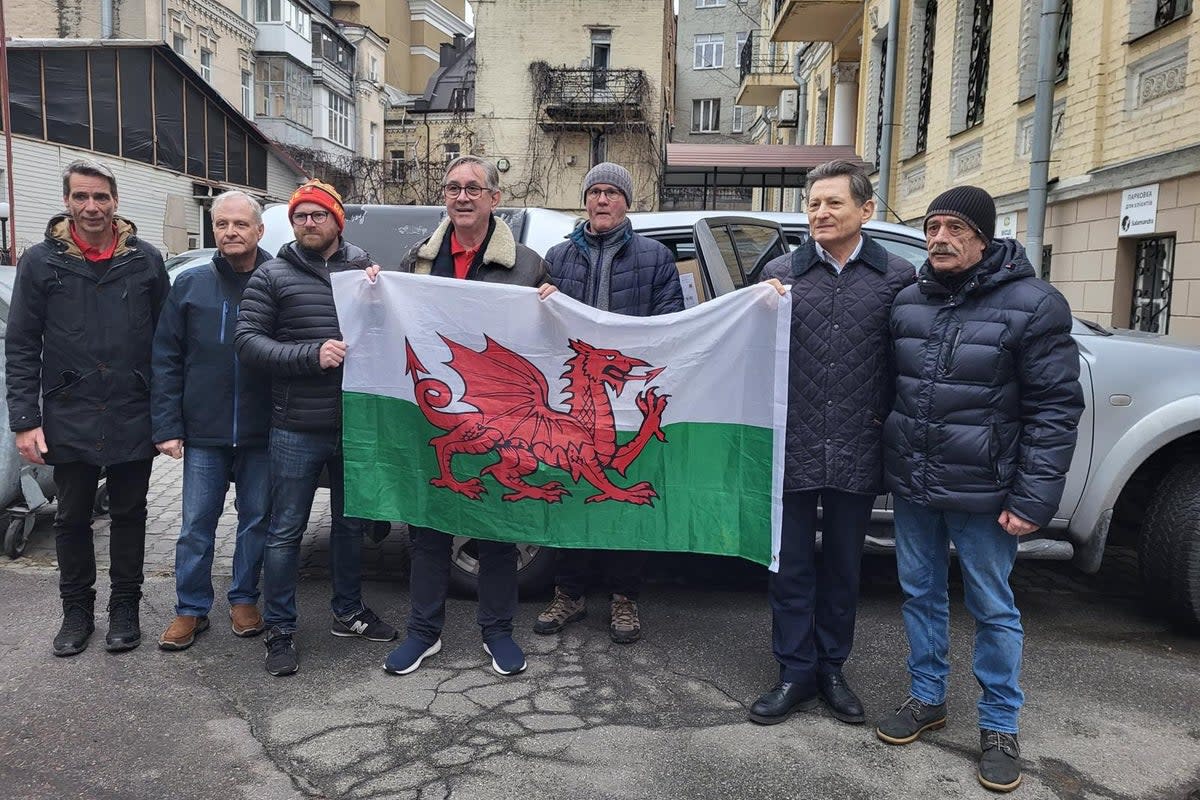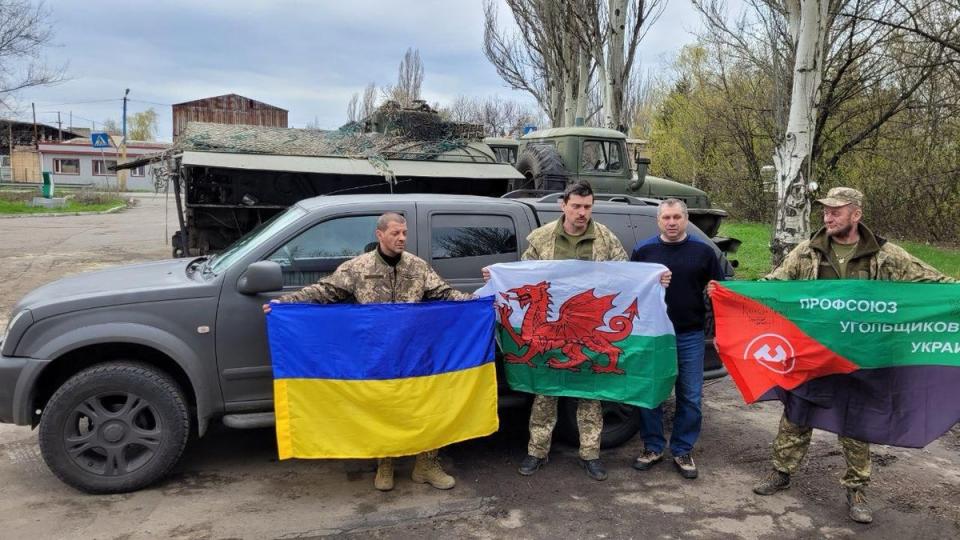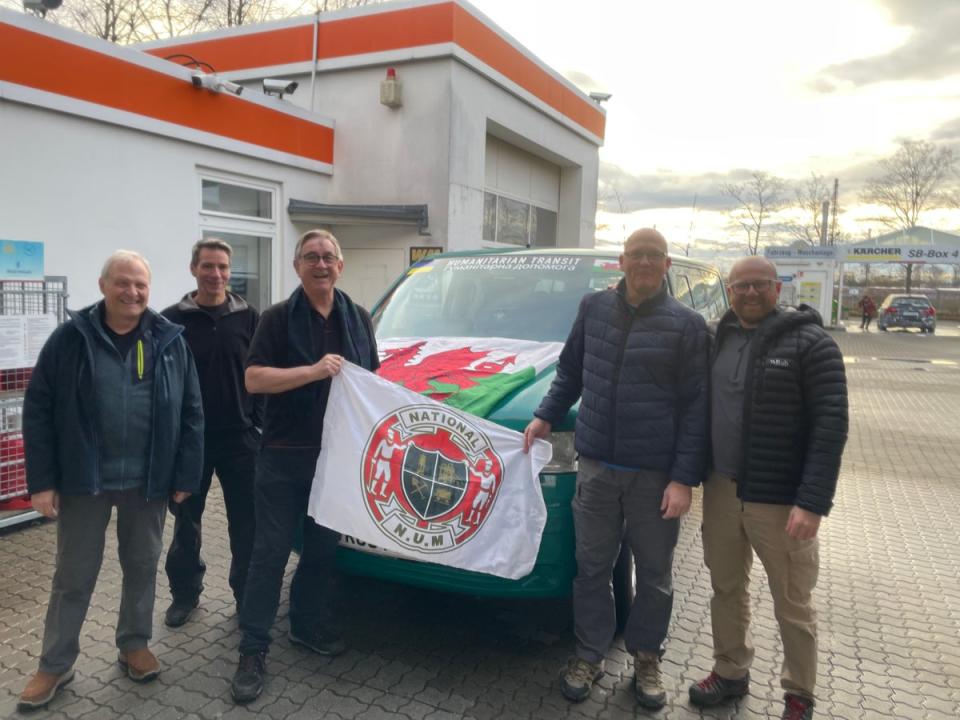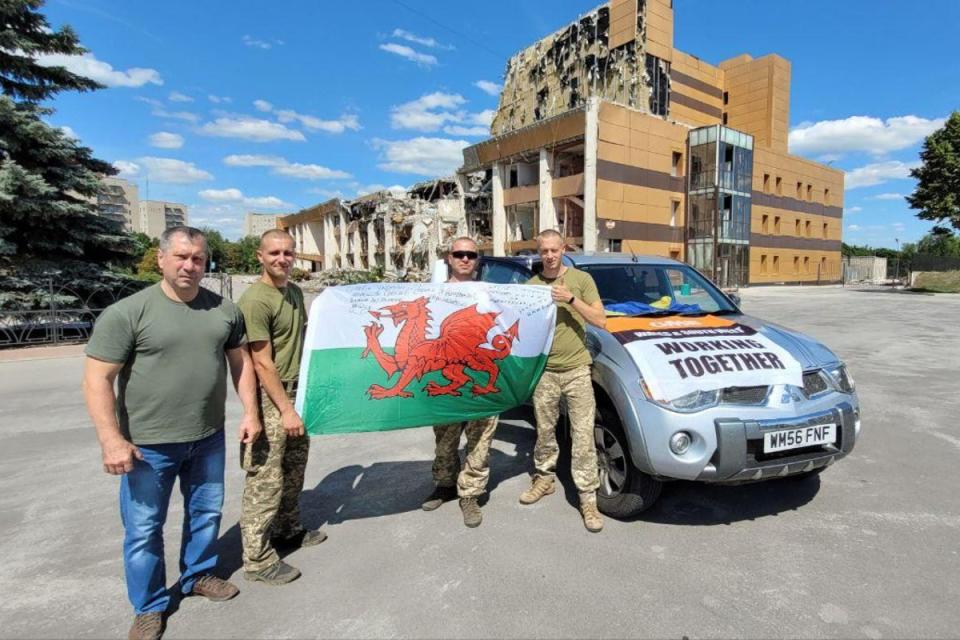Welsh miners send convoys of aid to Ukraine to repay help over 1984 strike

It is a bond forged during the miners' strike 40 years ago.
A trio of vehicles filled with drones, military equipment and medical supplies recently arrived in Ukraine – to help them defend against Russia's invasion – from Wales because of that bond.
One of the drivers was Wayne Thomas, who experienced the strike as a young miner and now, at 63, is vice-president of the UK National Union of Mineworkers (NUM).
Six volunteers set off with two Mitsubishi SUVs and a Volkswagen “Transporter” from Pontypridd in Wales, where the donated vehicles and supplies had been gathered at a NUM property. They overnighted in Folkestone and next day went by train under the Channel to Calais and drove through France, Belgium, the Netherlands, Germany and Poland before crossing into Ukraine after four days.
The other principal convoy organiser was Mick Antoniw, 69, Welsh Assembly member and Counsel General and Minister for the Constitution of the Welsh Government (Wales’s equivalent of attorney general). A former member of the British Labour Party’s national executive, Antoniw was helping to bring convoys of aid to Ukraine for the ninth time.
This trip marked £1 million pounds worth of donations - 15 vehicles plus various supplies - the group has sent to Ukraine since the full-scale war began on February 24, 2022.
Antoniw made contacts in the NUM because the firm of solicitors he belonged to before becoming a full-time politician often represented the miners’ union.
Another former miner and the “youngster” of the convoy at 35, was Carwyn Donovan, now an official of the Broadcast and Entertainments Union. The fourth driver was Jan Michaelis, 56, the technical director at the Welsh National Opera, who learned about the aid convoys from Donovan who represented the opera’s union members in negotiations while Michaelis sat on the management side of the table. The fifth was Roman Kozak, 69, who was born in Leicester, trained as a doctor at the Royal London Hospital and has lived in Canada since 1979.
Antoniw’s mother was Danish and his father, a refugee from Ukraine during the Second World War, as were both of Kozak’s parent. Both men have been interested in supporting Ukraine in various ways all their lives. Because both have been his friends from childhood, this reporter was invited to chronicle the convoy’s journey for The Independent.

During the miners' strike of four decades ago, Ukraine was still a part of the Soviet Union and a delegation of miners, headed by an official called Mykhailo Volynets from Ukraine’s largest coal mining region in Donetsk arrived to show solidarity with British comrades.
In 1989, Volynets rallied Ukrainian miners calling for independence from the USSR and when that came in 1991 he formed the Independent Trade Union of Ukrainian Miners – which joined the broader movement for democracy sweeping his country. It played an important role in mass protests in 2004 and 2014.
Following the full-scale 2022 invasion, the Ukrainian miners reached out to the NUM for help with vehicles and other supplies for the thousands of their members who had joined the Ukrainian military to defend their country.
Thomas explained that the miners had become especially close with the Ukrainian miners.
“And so when we were asked in 2022 for assistance it was a case of not ‘should we help?’ but ‘yes, and what do you need?’ And the NUM immediately sent £20,000 to the miners in Pavlohrad,” says Thomas.
Thomas has made five wartime trips to Ukraine. “The resolve of the Ukrainian people, all the people we’ve spoken to of all ages, is amazing. Their belief that their culture and country are worth fighting for leaves an enormous impression,” he says.
He adds that the Ministry of Defence (MoD) had contributed much surplus medical and (non-lethal) military kit including night vision equipment, trench cooking equipment, warm clothing, boots, helmets, body armour and medicines.
His daughter, Danielle Edwards, who has been involved with the army cadet force all her life – as a cadet and later as an instructor with the rank of major – has also helped enormously with the MoD’s goodwill.

Antoniw said individual former members of Britain’s armed forces have been among the largest donors.
Donovan said he first became aware of Ukraine through Antoniw who he had come to know when Antoniw was the miners’ union’s solicitor solicitor. He had told Antoniw to call him if he ever needed help over in Ukraine. That’s what Antoniw did one summer Monday morning in 2022 and by the next Friday Donovan says he found himself as the co-driver of a vehicle heading on the first of his trips into Ukraine.
He explains the connections that inspired the group: “First of all there’s that inexplicable bond that exists between miners whichever country, a will to help your colleagues.
He adds: “What first struck me was the Ukrainians’ sense of resolve, a sense of quiet determination, that Ukraine would not be destroyed. And Ukrainians have a sense of humour when faced with tremendous, real risks. I think that’s fairly similar to working underground.
“In all the times I’ve been out here [Ukraine], I’ve never seen anyone cry despite all the sorrow. People have told me they will cry because they’ve lost loved ones - but only after victory comes. I wish I was that strong.”
One of the other drivers, Michaelis, says he spent a lot of time visiting relatives in communist East Berlin and felt the absence of free speech and saw how his family had to be cautious about how they acted and what they said. “That gave me an understanding of what an oppressive regime can do to people from very early on in my life.”
He recognises Ukrainians face the same crackdown on freedom if they are occupied by Putin’s forces. “If Ukraine doesn’t manage to stop Russia now, Russia may well be in Poland next and if they are there they are only 20 minutes away from my hometown of Berlin. Ukraine is fighting the fight for Europe.”

Kozak says that Ukrainians are living under conditions most of us can't even fathom. “I don’t think we can appreciate in the West, living in peace, the tension of an ongoing war with the risk of air attacks, bombing and shelling," he says. "It has been valuable to experience what Ukrainians are going through."
He adds: “I’m very impressed by the attitude of Ukrainians - they realise the risks but don’t allow the war to stop their lives or prevent them doing simple things, like going out for a beer and enjoying life. That spirit to keep going.”
Antoniw was born in England but fell in love with Wales and its culture when he studied law at Cardiff University.
He has worked hard to cultivate cultural links between Wales and Ukraine. Antoniw draws, as do Thomas and Donovan, comparisons between the suppression of the Welsh language and Moscow’s Russification program which threatened to eliminate the Ukrainian language.
Antoniw is proud Wales has welcomed 7,000 Ukrainian refugees, mainly women and children. Many of them have found homes in his constituency of Pontypridd. He has noticed on this trip a “gloom” among Ukrainians caused by the impasse in the US Congress that has led to a severe reduction of artillery ammunition and other supplies critical for Ukraine’s defence.
“I’ve noticed this time particularly concern but I don’t see less determination on the part of Ukrainians to carry on fighting," Antoniw says. " But the concern is to what extent can you rely on Western promises to deliver? People are being killed because promised military supplies haven’t come.”
He says he had faced criticism for spending so much time on aid for Ukraine, but responds that he uses his holiday time for the support work and “all volunteers pay for their own accommodation and food expenses so that every penny of donated money goes on aid.”
The three vehicles were handed over in Kyiv to people who in turn were driving them to military units where PRUP union miners from Pavlohrad serve.
Vitalyi Pyvovar, who picked up on of the vehicles, says some 5,000 of PRUP’s 25,000 miners are on the frontline at any time. About 400 members have been killed.
Pyvovar says: “We have had a long relationship with the Welsh miners. Many years ago they were facing hard times [because of the 1984 strike] and my father’s generation tried to help them. Now, when Ukraine is afflicted by troubles, they are helping us.”


